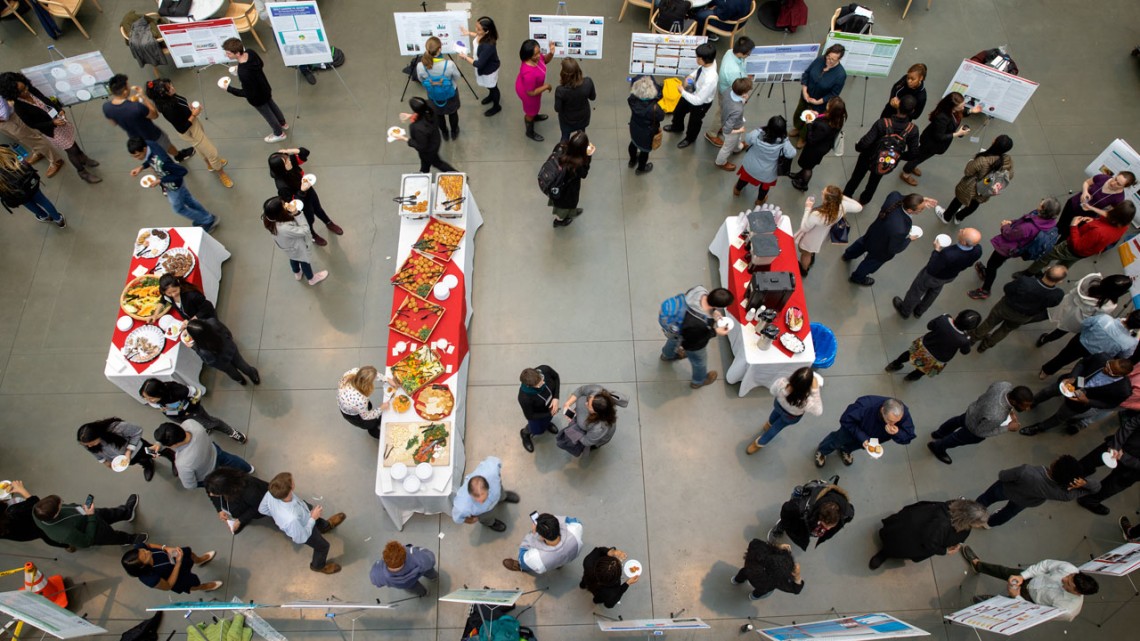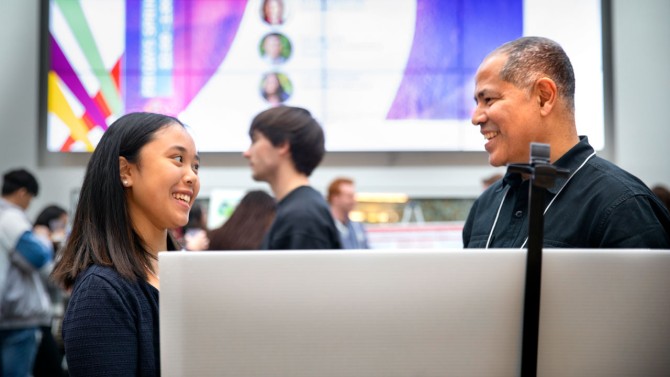
Students present posters and discuss collaborative engaged-learning experiences at the 2019 Community Engagement Showcase April 15 in Klarman Hall.
Students showcase their community engagement work
By Blaine Friedlander
From Buffalo’s snowy sidewalks to Puerto Rico’s island warmth to a newly restored library in Ghana, Cornell students work in contrasting locales with community partners around the globe – and they’re making a difference. The students shared their global experiences through posters April 15 at the 2019 Community Engagement Showcase.
“The showcase celebrates how Cornell students support global communities and connect with people who live locally or half a world away,” said Mike Bishop, director of student leadership for the Office of Engagement Initiatives. “Our students are passionate and dedicated to building relationships with their community partners.”
Community engagement takes many forms, including research and leadership, and brings about partnerships locally, domestically and globally.
“All of the students take action in some form with an off-campus partner,” Bishop said. “They may work with a nonprofit organization or a government office. Some students have conducted research, others have undertaken community organizing, and some have developed educational initiatives.”
Katelyn Palumbo, M.P.A. ’19, worked through the Jewish Family Services of Buffalo and Erie County, in coordination with the Cornell Institute of Public Affairs to help address issues faced by resettled refugees in Buffalo. About 85 languages are spoken in the western New York region, and communications about weather, for example, can be a challenge.
“We surveyed the families, and they don’t understand notifications about schools being closed, or understand the severity of the weather,” said Palumbo. “Either families will send kids to school when schools are closed, or see some snow and not send their kids to school.”
Palumbo and others are working on technology solutions like smartphone apps to send notifications via audio or text messages in familiar languages.
The posters, which lined Klarman Hall’s Groos Family Atrium, promoted many student experiences. Patricia Muumba ’19, who worked in Uganda, explained the experiential power of educational architecture and showed how learning spaces are microcosms of their communities.
The poster by Alex Li ’20 noted that humans can generate about 680 pounds of carbon emissions each month. Students can subscribe to get carbon offset credits – helping them save the Earth and save money – through Green Club, an effort he started. The club works with nonprofit groups and commercial partners to provide student discounts on goods and services. “We want to make climate change an issue that students are impacting,” Li said.
The small island of Vieques in Puerto Rico relies on the bigger island for water, electricity, food and supplies, making it vulnerable during hurricanes or other weather crises. Four students – Qihan Zhao, M.Eng. ’19; Ethan Frisch, M.Eng. ’19; Stanford Cooper ’18, M.Eng. ’19; Thomas Suesser, M.Eng. ’19 – explained how they are rehabilitating a historic cistern at Fuerte de Vieques to make the island more resilient. The water-collection system will feature solar-powered pumps to bring 2,000 gallons of drinking water a day to the residents.
Osei Boateng ’18, M.H.A. ’20, founder of OKB Foundation, and Rayshard Thompson ’21, who worked with the foundation to conduct health education plus hypertension and diabetes screenings over winter break in Ghana. They partnered with local nutritionists, dentists and physicians to promote healthy lifestyles.
Naedum DomNwachukwu ’20 and Steiner Abayie ’20 presented their Scholars in Our Society and Africa poster. Their group is dedicated to investing in underprivileged communities in Africa and the United States to prepare for a population boom.
“Africa will have explosive population growth in the next 30 years,” said DomNwachukwu, who said his group is renovating a library in Ghana. It is expected to open this summer. “If that growth isn’t addressed in positive way, African communities can end up in humanitarian crisis – without access to food or medicine – simply because of a lack of investment. Our group sees a potential future with economic growth and the way to get there is through educational initiatives.”
Working with Scholars in Our Society and Africa, Abayie is a first-generation student whose parents are from Ghana, enjoys the satisfaction of helping others. Said Abayie: “It’s important for me to give back to the community that helped me.”
Media Contact
Get Cornell news delivered right to your inbox.
Subscribe
